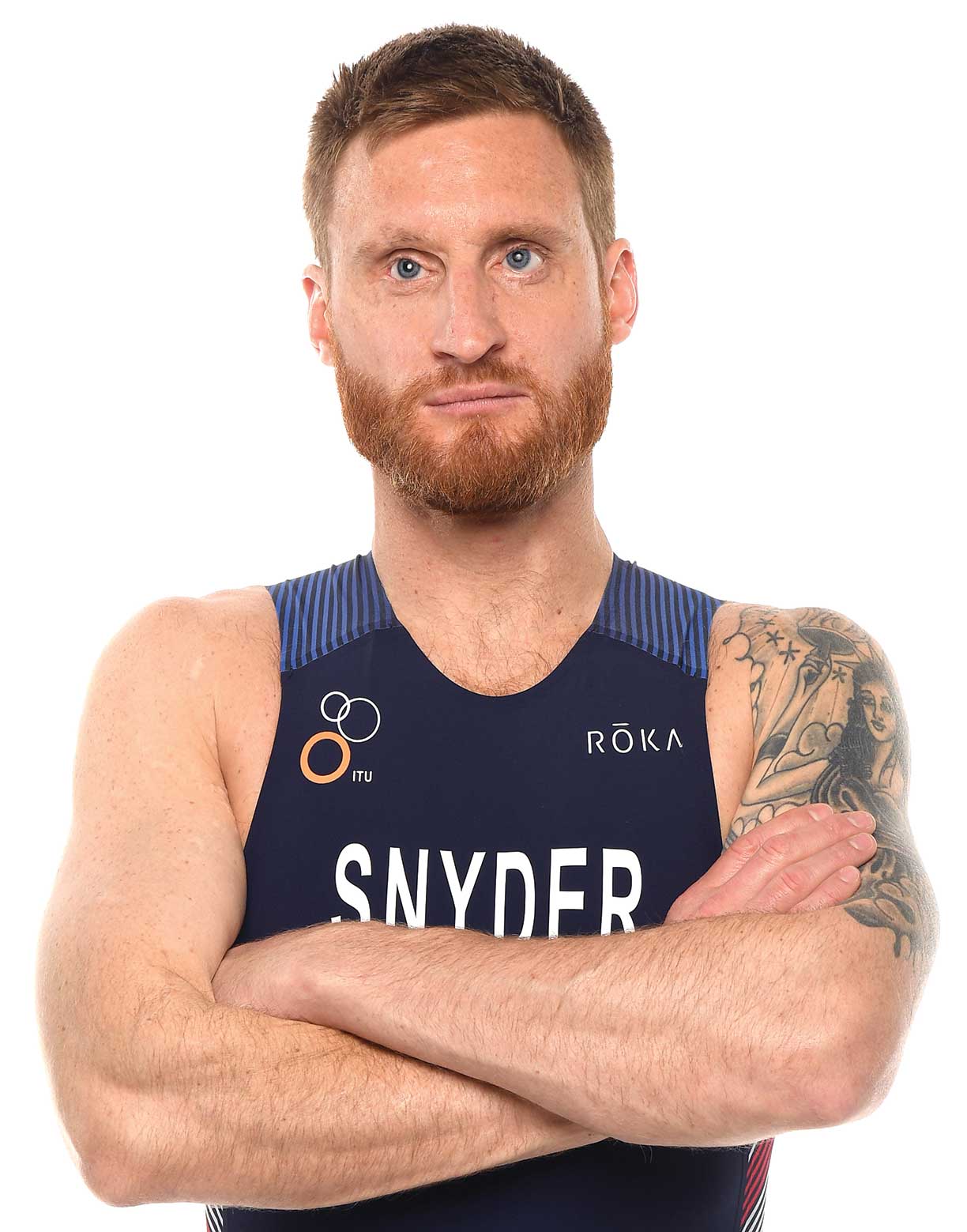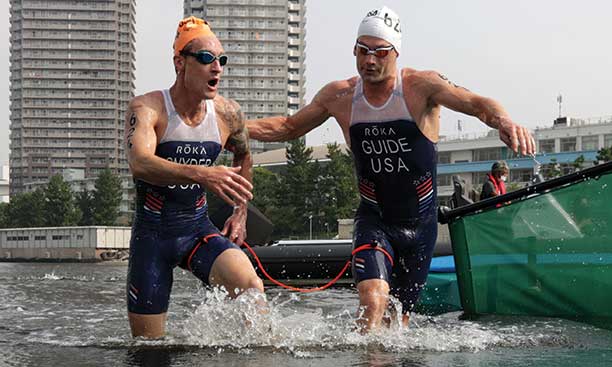Blinded by an IED, Brad Snyder Made History in the Triathlon
Snyder is the first American man to win gold in the triathlon either in the Paralympics or the Olympics
At the Paralympics in Tokyo this summer, Brad Snyder GS won a gold medal in the triathlon, becoming the first American man to do so either in the Paralympics or the Olympics.
Back in New Jersey just a few days later, he got a new seeing eye dog: Mr. T. The next day, he started his third semester at the School of Public and International Affairs, where he’s working on a doctorate.
Sound like a whirlwind? Keep reading.
When Snyder was 8 and growing up on the Gulf Coast of Florida, he wanted to join the Navy, following in the footsteps of three of his four grandparents. In high school, he set his sights on the U.S. Naval Academy, where he competed in swimming all four years and ultimately captained the team his senior year. After graduation, he started competing recreationally in triathlons and really enjoyed it — he even convinced himself that he should start training for the Half-Ironman Nationals, so he bought a fancy new bike.
Then came his second deployment. Snyder had joined the Navy as an explosive ordinance disposal (EOD) officer — “the bomb squad of the Navy,” he says. EOD officers have spent a lot of time in Iraq, Afghanistan, and the Horn of Africa trying to mitigate the improvised explosive devices used by insurgents.
“Everything is covered in IEDs as far as I can see, and so my job was to kind of clear a path for us to get from point A to point B,” Snyder says. That’s what he was doing in Afghanistan on Sept. 7, 2011.
While another EOD officer led the patrol, Snyder saw a giant blast up ahead: Two Afghan commandos in the mission had stepped off the cleared route and onto a 40-pound IED. Snyder cleared a path with his metal detector for the medics to get through, and he helped deliver the first casualty to a site 100 feet away where a helicopter could land.
On his way back to help the second casualty, Snyder stepped on another IED, presumably about the same size.
“I was convinced more than anything I’ve been convinced of in the past that I was dead and I was moving on,” Snyder says. “I reflected on my entire life, on all the things that I had done — good and bad, stupid or smart, whatever it was — and I thought, ‘I think I’ve lived a pretty good life, and I’m proud of the life that I’ve lived, and I’m sad that it won’t continue on, but I’m ready for whatever happens now.’”
But he didn’t die. “It’s an incredible experience to go up to that brink and come back,” he says. The IED detonated about 2 feet in front of Snyder instead of underneath him. That distance saved his life, but the blast glanced his face and left both of his eyes irreparably damaged.
“It’s not about winning, it’s about competing. It’s about putting yourself out there … setting a goal that’s beyond what your current capability is and then holding yourself to it and putting in the time and trying to develop to a point where you can do something beyond what you thought you were capable of.” — Brad Snyder GS
His younger sister, Elyse, remembers sitting with their mother in his hospital room as visitors came through, distressed. Snyder remained calm, she says, treating each visit as a joyous moment. “One thing that he’s really good about is his perspective — there’s always a way to flip a negative to a positive.”
Snyder remembers family and friends were upset by his loss of vision, without appreciating that he had gained back his life. “Every day, every moment, everything after this was something that I might not have had, and nobody could feel that more potently than me.”
Then he met a man who almost seemed excited about Snyder’s blindness. A representative from the U.S. Association of Blind Athletes kept saying, “‘Do you realize how lucky you are to be injured in a Paralympic year?’” Snyder remembers. “He was like, ‘If you go anywhere close to the times you did as an able-bodied swimmer, you’ll crush the Paralympics!’”
Snyder hesitated, but the representative was persistent. Elyse remembers that her brother’s scars were still purple and pink the first time he got back in the pool. He swam with a scuba mask covering his whole face, and the pool was lined with foam noodles so he wouldn’t crash into the walls. “Watching him swim again just made so much sense,” she says.
He competed in the London Paralympics less than a year after his injury, winning two gold medals and a silver. In Rio four years later, he won three golds and a silver, and he broke a 30-year-old world record in the 100-meter freestyle. It was an incredible experience, but he wasn’t sure he wanted to keep swimming.
“This whole endeavor is not about a gold medal,” he says. “It’s not about winning, it’s about competing. It’s about putting yourself out there … setting a goal that’s beyond what your current capability is and then holding yourself to it and putting in the time and trying to develop to a point where you can do something beyond what you thought you were capable of.
“That’s what I’m trying to inspire people to do.”
So Snyder set a new challenge and in 2018 turned back to his triathlon dreams. Shortly after, he met his future wife, Sara, who’s athletic herself. They trained together, and Snyder credits her for keeping him going on the hardest days.
He planned to return from Tokyo in 2020 to begin classes at Princeton, where his principal interest is civil-military relations. A few years earlier, Snyder had taught part time at the Naval Academy, an experience that inspired him to pursue a doctorate to perhaps return as a professor of leadership and ethics one day. But then the pandemic delayed the Paralympics. That meant he’d have to keep training while working on his Ph.D.
“I knew it was going to be incredibly difficult, if not impossible, for me to even make the Tokyo team,” he says. He told himself he’d be OK if it didn’t happen, then went out and trained hard.
Right after the school year ended, Snyder won a triathlon for the first time and made the team. It lit a fire under him. He spent the summer training in Hawaii with his guide, Greg Billington, a member of the 2016 U.S. Olympic triathlon team.
“I liked the energy with which he attacks triathlon,” Billington says. “He’s a fun guy to be around: not only very competitive and athletic, but also just fun to know as a person.”
The pair completed the Paralympic triathlon — 750 meters of freestyle swimming with a tether between them, 20 kilometers of tandem cycling, and 5 kilometers of running with a tether — in 1 hour, 1 minute, and 16 seconds.
“When he crossed the finish line and he held the tape up really aggressively, I knew it wasn’t just because he was winning,” Sara says. They hadn’t told anyone yet, but she had just reached the 12-week mark in her pregnancy with their first child. “In my head, the monologue in Brad’s head was: ‘I just won and I’m going to be a dad!’ That was a big drive for him as he was racing and then winning gold.”
While Snyder thought he might retire after Tokyo, he had second thoughts while on the podium.
“I’ve been working so hard to set a positive example for people I don’t know. Why would I stop if I want to set a good example for my kid?” Snyder says. And he’s up for another challenge.













No responses yet